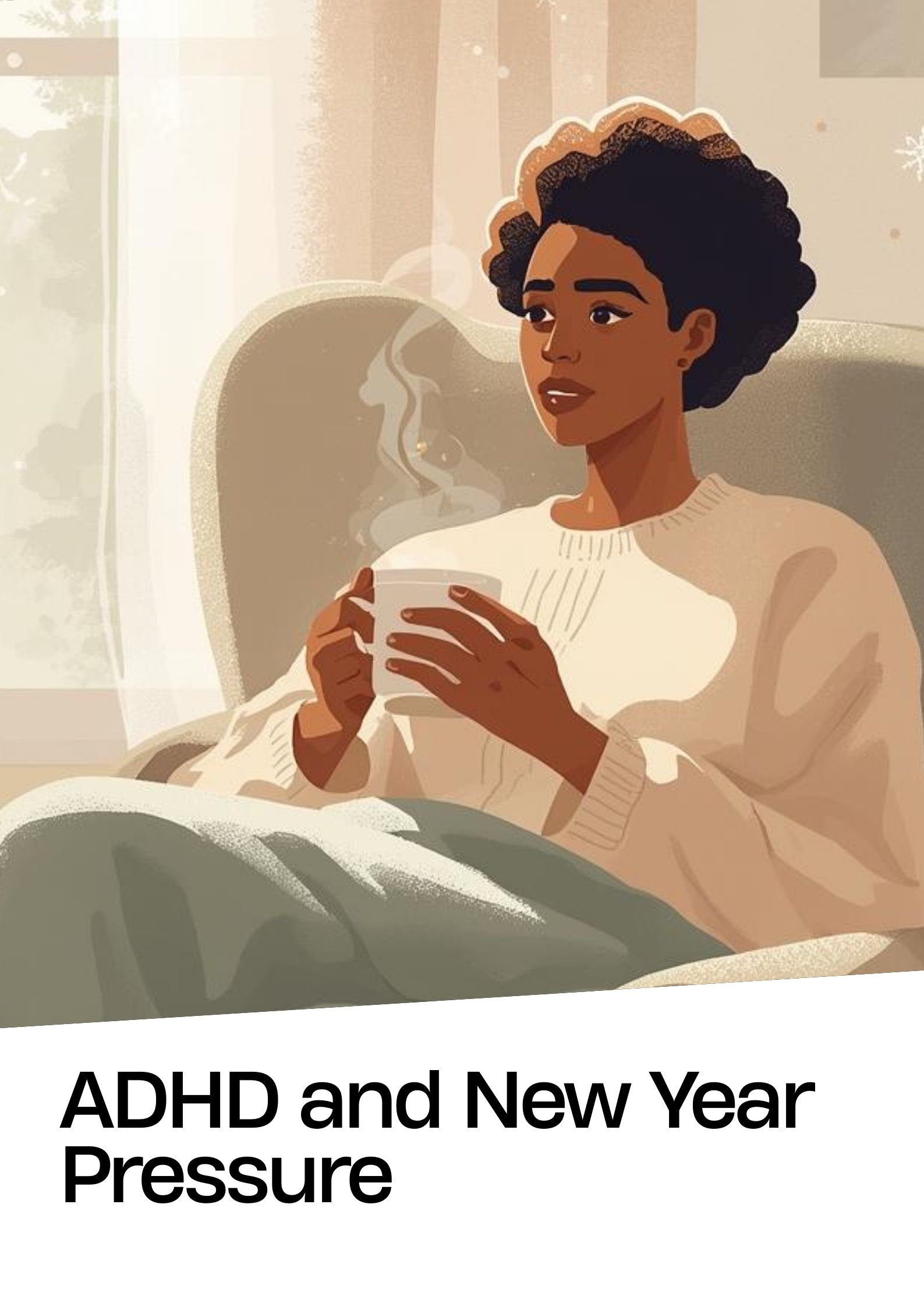Book Now
Menu
Have you ever felt like your brain's wiring is a bit different from others? Maybe you've noticed you process information, react to emotions, or handle tasks differently from your family, friends, people at work or school. If these thoughts resonate with you, you might be part of the wonderfully diverse group known as neurodiverse individuals. Neurodiversity includes conditions like ADHD, autism spectrum disorders, and others that reflect variations in the human brain regarding sociability, learning, attention, mood, and other mental functions.
Understanding ourselves better can open doors to tailored support and strategies that enhance our lives. If you suspect you might be neurodiverse (specifically ADHD/Autistic) for the purposes of this article, getting a professional assessment is the first step. This article is here to guide you through the assessment process in Ontario, showing you how to navigate both the public healthcare system and private options, ensuring you know where to go and what to expect.
Ready to embark on a journey of self-discovery and empowerment? Let's dive into the world of neurodiversity assessments in Ontario, crafted to help you find the path that best suits your needs.
The term "neurodiversity" refers to the concept that everyone's brain works differently. These differences are normal variations in the human population. For the purpose of this article, we’re only focusing on two common types of neurodivergence in order to get assessed: ADHD (Attention Deficit Hyperactivity Disorder), Autism spectrum disorders. Being neurodiverse can affect how a person thinks, learns, processes information, and interacts with the world around them.
Identifying as neurodiverse often starts with self-reflection. You might notice that you have unique challenges in social settings, managing tasks, or communicating. Here are a few signs that might suggest you are neurodiverse:
Difficulty focusing on tasks that don't interest you, but intense focus on those that do.
Social interactions feel challenging or exhausting, or you might miss social cues that others pick up easily.
Sensitivity to sensory inputs like sounds, lights, or textures more than others.
Thinking patterns that are highly creative or analytical, but perhaps struggling with organizational skills.
Recognizing these traits in yourself can be enlightening and might explain experiences you've had throughout your life that seemed out of sync with others around you.
An official assessment can validate your experiences, both to yourself and others, and open up new pathways for support and personal growth. It can help you understand your strengths and challenges, leading to strategies that cater to your unique way of processing the world. Whether it’s leveraging your intense focus to excel in a hobby or career, or developing techniques to manage sensory overload, understanding your neurodivergence is the first step toward living more comfortably and confidently in a neurotypical world.
Getting assessed for neurodivergence in Ontario can be navigated through public healthcare channels or by connecting with private practitioners. The process generally involves consultations with healthcare professionals who specialize in diagnosing neurodevelopmental disorders. These might include psychologists, psychiatrists, or neuropsychologists.
Starting with your family doctor or a general practitioner (GP) is often the best first step. They can discuss your concerns and symptoms with you and provide a referral to a specialist if necessary. When you visit your doctor, it's helpful to bring notes about your experiences and any specific challenges you face, as this information can assist in making an accurate referral.
If your GP thinks a specialist assessment is needed, they can refer you to a specialist covered by the Ontario Health Insurance Plan (OHIP). This might include a referral to a psychiatrist or a neuropsychologist who specializes in diagnosing neurodivergence. While this option can be cost-effective since it’s covered by OHIP, it’s important to note that wait times can vary and may be lengthy due to high demand in public health services.
Once your referral is processed, and you have an appointment, preparing can make the assessment go smoothly. You might be asked to fill out questionnaires or to have someone close to you provide input about your behaviors and experiences. This helps the assessing professional get a complete picture of how your potential neurodivergence affects different areas of your life.
During the assessment, various diagnostic tools might be used, such as:
Interviews and questionnaires to gather detailed information about your experiences, behavior, and skills.
Behavioral assessments to observe how you interact and react in certain situations or tasks.
Cognitive and psychological testing to measure aspects of your thinking, problem-solving, and emotional regulation.
Each tool helps paint a more complete picture of your neurodivergence, aiming to offer a diagnosis that can guide your path to managing and thriving with your unique brain wiring.
For those who prefer not to wait for services through the public system or are looking for a more immediate assessment, private options can be a viable alternative. Private clinics and online services in Ontario offer assessments for neurodivergence, including ADHD and autism spectrum disorders. These services are not covered by OHIP, so costs can vary, but they often provide quicker access to diagnostics.
When considering a private assessment, it’s important to research and choose providers who are reputable and have the necessary credentials. Psychologists, psychiatrists, and neuropsychologists should be registered with a professional body, ensuring they meet the standards required to practice in Ontario. Here are some noteworthy providers that offer assessments:
Centre for Addiction and Mental Health (CAMH): CAMH provides Adult Neurodevelopmental Services, including short-term, goal-oriented autism diagnostic assessments for adults. These assessments are available across Ontario, but a physician referral is required to access them.
Dalton Associates: This organization offers a range of psychological services across Ontario, including autism assessments for adults. Services at Dalton Associates can be accessed directly without a referral. Some of their services may also be covered under private insurance or require out-of-pocket payments.
Talkwithfrida.com: Specializes in ADHD assessments and provides an initial online evaluation followed by a detailed assessment if necessary.
BeyondADHD.com: Offers comprehensive services for ADHD, including assessments, therapy, and ongoing support.
AdultADHDcentre.com: Focuses on adults with ADHD, providing diagnostic services as well as strategies for managing symptoms and improving quality of life.
Blueprint Counselling: Blueprint Counselling provides ADHD assessments. This service can be a valuable option for individuals seeking to understand and manage symptoms of ADHD.
Private assessments typically begin with a detailed intake process, where the provider will gather information about your medical history, symptoms, and life experiences. This might involve filling out detailed questionnaires and having an initial consultation, either in person or online.
Following the initial consultation, a series of cognitive and psychological tests may be conducted. These tests are designed to evaluate various aspects of your mental functioning, including attention, memory, problem-solving abilities, and emotional regulation. The goal is to obtain a clear and comprehensive understanding of your cognitive profile and identify any signs of neurodivergence.
Since private assessments are not covered by OHIP, it's important to be aware of the potential costs involved. Some providers may offer payment plans or sliding scale fees based on income, which can make the process more affordable. Additionally, if you have private health insurance, it’s worth checking whether any of the costs can be reimbursed under your plan.
Proper preparation can make a significant difference in the effectiveness and accuracy of your neurodivergence assessment. Here’s how you can prepare to ensure the process is smooth and the results are useful.
Daily Notes: Start by keeping a journal of your daily experiences related to potential neurodivergent traits. Note situations where you find yourself struggling or excelling, any consistent patterns in your behavior, and reactions to different environments.
Specific Examples: Include specific examples of challenges and strengths. For instance, if you struggle with maintaining focus, describe the contexts in which this happens and what, if anything, helps you regain focus.
Medical History: Compile any relevant medical, psychological, or educational records. Previous diagnoses, assessments, or reports from school that highlight learning challenges or accommodations can be particularly helpful.
Family Input: If possible, ask family members or close friends to provide their observations of your behaviors and characteristics. Their perspectives can offer additional insights into how your potential neurodivergence manifests in various settings.
Schedule Wisely: Choose an assessment time when you are typically at your best, considering time of day and other personal factors. Ensure you have a good night’s sleep beforehand and plan a low-stress day.
Comfort Measures: On the day of the assessment, wear comfortable clothing and bring any items that might help you stay calm and focused, like stress balls or fidget toys.
Set Realistic Expectations: Understand that the assessment is just one part of understanding your neurodivergence. It may not provide all the answers but will be a significant step towards better self-understanding.
Support System: Consider bringing a supportive friend or family member to wait during your assessment or to be there with you before and after. Having support can ease anxiety and provide immediate comfort and feedback.
By taking these steps, you can approach your assessment with confidence, knowing that you are well-prepared and informed. This preparation not only aids the professionals in making an accurate assessment but also ensures that you are actively engaged in the process, leading to more personalized and effective outcomes.
Receiving a diagnosis of neurodivergence can be both relieving and overwhelming. It’s important to understand what your diagnosis means for you personally. A detailed discussion with your assessor can provide clarity on your specific condition, whether it's ADHD, autism spectrum disorder, or another form of neurodivergence. They should offer insights into how this diagnosis might impact various aspects of your life, including work, relationships, and personal growth.
After your assessment, you should receive a comprehensive report that details the findings and conclusions. This report will include:
A confirmation of the diagnosis and its criteria.
An overview of your strengths and areas that might require support.
Recommendations for treatments, therapies, or interventions that could help manage or enhance your abilities.
It’s crucial to review this report thoroughly. If anything is unclear, don’t hesitate to ask your assessor for explanations or further details.
Once diagnosed, tapping into available support systems and resources can greatly assist in managing your neurodivergence:
Therapeutic Support: Consider therapies that align with your needs. Take your time meeting with different therapists to ensure that they understand what you’re looking for and that you’re a good fit.
Educational and Workplace Accommodations: Explore what accommodations might be available to you in educational settings or at work to help mitigate challenges and leverage your strengths.
Support Groups and Communities: Connecting with others who share similar experiences can provide emotional support, practical advice, and a sense of community.
With a clearer understanding of your neurodivergence, you can begin to implement strategies that make daily living easier and more fulfilling. This might involve:
Organizational tools and apps specifically designed for neurodiverse individuals.
Techniques to manage sensory overload, such as noise-canceling headphones or specific routines.
Strategies to improve communication and interpersonal relationships.
Neurodivergence is often accompanied by varying needs over time. Regular check-ins with mental health professionals can help you adjust your strategies and interventions as your life changes. This ongoing support ensures that you continue to thrive and adapt effectively.
Becoming informed about your rights and advocating for yourself in various settings (like in educational or professional environments) is crucial. Additionally, educating those around you about neurodivergence can help build understanding and support networks.
Embracing the journey towards understanding and managing your neurodivergence is a powerful step toward self-discovery and personal empowerment. If you suspect you might be neurodiverse, getting assessed is more than just receiving a diagnosis—it's about gaining a deeper insight into your unique cognitive profile and learning how to navigate the world in a way that suits you best.
Remember, whether through the public healthcare system or private options, the path to assessment is a crucial first step in accessing the support and resources that can help you thrive. With the right information and preparation, this process can be a transformative experience, leading to greater self-awareness, improved relationships, and enhanced quality of life.
Neurodiversity is a part of human diversity. Knowing and understanding your neurodivergence not only helps you but also enriches our community with a broader perspective of what it means to be human. So, take the step, reach out for an assessment, and move forward with confidence, equipped with knowledge and support tailored just for you. Here’s to embracing your uniqueness and all the possibilities that come with it!



